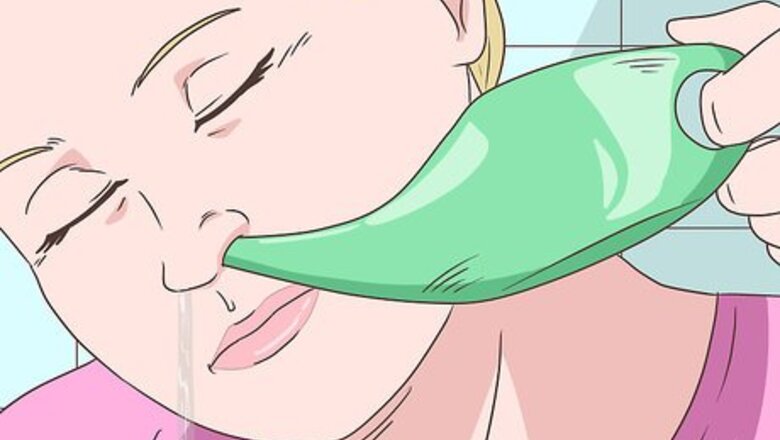
views
X
Expert Source
Monica Kieu, DO, FACSBoard Certified Otolaryngologist
Expert Interview. 20 October 2020.
If you have a nasal tear, you may experience nose bleeds, difficulty breathing out of your nose, or nasal pain. Most nasal tears heal simply by eliminating the underlying cause, such as treatment of the disease or removal from the substance causing the chronic irritation. However, you should see a doctor for diagnosis if you have chronic symptoms. You may require surgery if your nasal tear is severe and is causing problematic symptoms, such as recurrent nosebleeds, obstruction caused by crusting, or even a whistling sound caused by air moving through perforation.
Doing Home Care
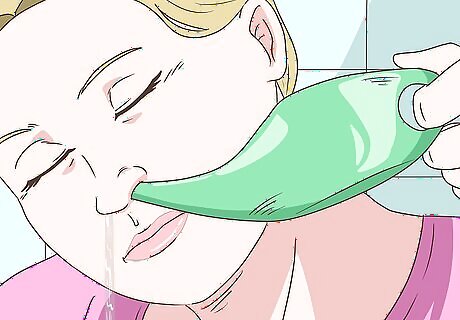
Flush your nose with saline solution. Due to the nasal tear, your nose may be very dry. There may also be a crust that forms around the hole in your septum, leading to nosebleeds and increased dryness. You can keep your nose moist by using a saline solution to flush out your nose. You can do this with a neti pot or with a saltwater nasal spray. Keep in mind flushing your nose with saline solution will only offer temporary relief for dryness, nosebleeds, and nasal congestion. To really address the issue, you will likely have to see your doctor.
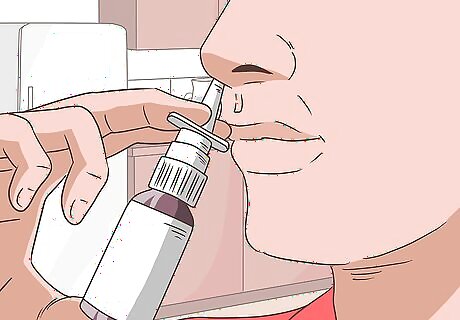
Try an over-the-counter nasal spray. You can also try using OTC nasal spray to help keep your nose moist and clean. Look for a saltwater (saline) nasal spray or nasal spray for dryness and irritation. Follow the dosage instructions on the package to ensure you use the nasal spray correctly. Try to avoid nasal sprays with the preservative benzalkonium chloride (BKC), which can be damaging to protective cells in the nose. Overuse of decongestant and steroid nasal sprays can cause nasal tears, so you should avoid these. If you are already using a lot of nasal spray and your nasal issues are not getting better, you should see your doctor for a diagnosis.
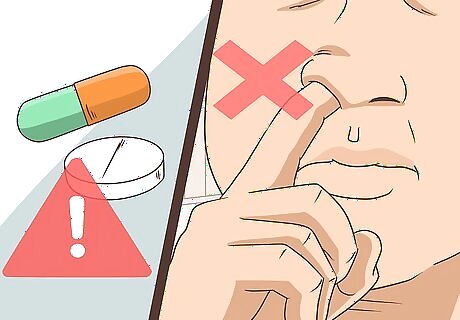
Avoid substances and behaviors that could make the nasal tear worse. Stop using any substances, such as recreational drugs, that could make the nasal tear more severe. You should also stop picking your nose, especially if it is a chronic habit, as it can make the nasal tear worse. If you work with industrial chemicals, you may want to consider cutting back on the amount of time you spend in this environment, as exposure to industrial chemicals can lead to nasal issues, including nasal tears.
Diagnosing the Nasal Tear
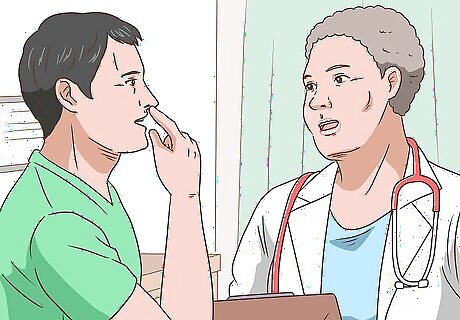
Discuss your symptoms with your doctor. If your symptoms do not improve with home care, you should go see your doctor for a diagnosis. You may want to see an otolaryngologist (commonly known as an ENT physician) who specializes in diseases and disorders of the ears, nose, throat, and related areas of the head and neck. Start by describing your symptoms to your doctor so they can get a sense of your condition. You may experience nosebleeds, difficulty breathing, or nasal whistling, where a whistling sound happens when you try to breathe in and out of your nose. Be forthcoming about your symptoms so your doctor can make a proper diagnosis. For example, your doctor may ask you, “When did you first notice issues with your nose?” “What kind of symptoms are you experiencing?” “How long have you had these symptoms?” “What do you think is the cause of these symptoms?”
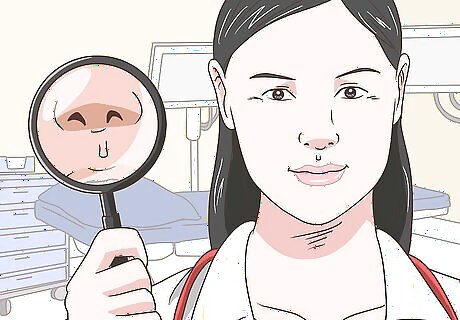
Allow the doctor to do a physical exam of your nose. Your doctor will then examine your nose externally and internally. They will be looking for a hole in your nasal septum, any tissue buildup on a wound in your nose, or any crusting inside your nose. The doctor may need to do an rhinoscopy or a nasal endoscopy to determine the location of the hole in your nose. This requires the insertion of a very small camera and light into your nose. The physical exam can be done in the doctor’s office. You will need to remain still and calm during the physical exam so the doctor can do a thorough check.
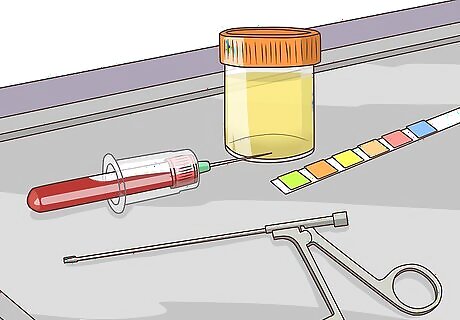
Let your doctor run tests. The doctor may also run tests on your urine and run a blood test to determine if there are any diseases or conditions that are causing your nasal tear. They may also do a biopsy of septal tissue in your nose to test for any fungal or bacterial infections. If the doctor suspects drug use, they will screen you for certain drugs to determine if this may be the cause of the nasal tear.
Getting Medical Care For the Nasal Tear
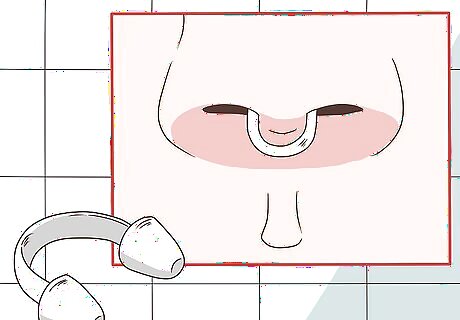
Ask your doctor about a nasal plug. If you want to avoid having surgery on your nose, your doctor can try plugging your nasal tear with a special button made of soft plastic. The nasal button can help to reduce crusting and nosebleeds. It can also help to stop the whistling sound you may make when you breathe through your nose due to the nasal tear. Speak to your doctor about this option as well as any side effects of the procedure before you go through with it.
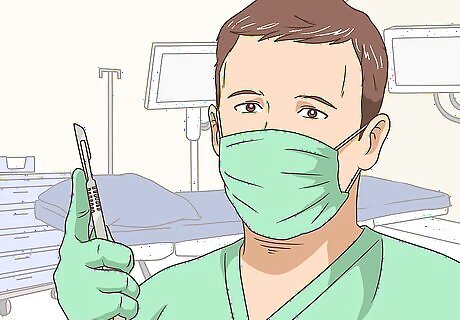
Talk to your doctor about nasal septal perforation repair. Nasal septal perforation repair is a surgical procedure that will help to close the hole in your septum. During this procedure, the doctor will take tissue from another part of your body, such as inside your nose, and sew it into the hole. They can also use the tissue to create a flap that will cover the hole in your septum. You will be under general anesthesia during the procedure. The doctor may also use a local anesthetic to numb your nose during the procedure.

Discuss the recovery process for nasal septal perforation repair with your doctor. If you do opt for surgery to correct your nasal tear, make sure you are aware of the recovery process beforehand. You will need to keep gauze in your nose for 48 hours after the surgery. You will likely experience pain and bleeding from your nose. The doctor will give you pain medication to manage your symptoms as you recover. During your recovery, you will need to avoid decongestant nasal sprays, smoking, and medication that contains caffeine. If the hole is very large in your septum, there is a risk it may open up again, even after the surgery. You may then require another surgery to repair the hole again. After surgery, there will be swelling which may make it difficult to breathe through your nose. Avoid forceful nose blowing or insertion of any objects (including fingers) into the nose.



















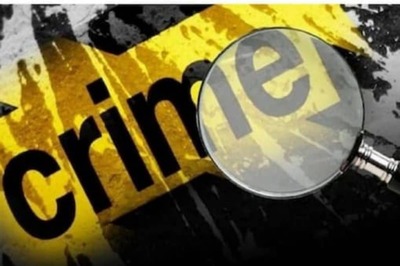
Comments
0 comment